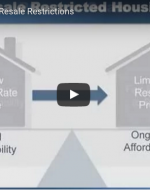This report provides an easy to digest overview of the goals for shared equity resale formulas and describes some of the most common options. View Report


For inclusionary homeownership units, communities generally implement shared equity homeownership programs, which allow income-qualified homebuyers to purchase units at below market prices, but require that the homes resell only to another lower-income buyer for no more than an affordable price set by a shared equity resale formula.
These resale restrictions can be implemented through a deed restriction, loan agreement, or a community land trust ground lease. There are a number of different formulas in use, but the most common allow sellers to keep a predefined portion of the increase in the market value of a home. By limiting the rate of price appreciation, the programs can offer affordable homeownership opportunities to one family after another.
Common resale formulas in use by inclusionary housing programs across the country include appraisal-based formulas where the price increases by a set percentage of the increase in appraised value over time; fixed-rate formulas where the price increases by a fixed annual percentage; and index-based formulas where the price increases by the percentage change of a published index, like area median income. Read more on the formulas ->
Regardless of which resale formula is used, program restrictions also include a provision that requires sellers to contact the jurisdiction or program manager when they decide to sell. The formula price can be calculated or verified and the appropriate process is followed for marketing and buyer screening.
The most effective resale formulas not only strive to balance affordability with wealth creation, but they are simple. When managing resales, conflicts most often arise when the resale formula is not transparent, cannot be easily calculated and understood, or is not effectively communicated to the buyer at the time of purchase.
When homeowners are truly unable to sell their homes to income eligible buyers, many programs allow a “Right to Sell” provision so that owners are not trapped. Policies vary, but typically the home must be on the market for 90 to 180 days.
After a good faith effort, if they are unable to sell, the homeowners are generally allowed to sell the home to non-income qualified buyers. In some cases, this sale is allowed only at the affordable price. Other communities allow a market-rate resale but recapture any excess proceeds above what the seller would have received if they had sold at the affordable price.
Setting resale prices must balance the goal of preserving affordability and allowing homeowners to build equity. It is a good policy for cities to periodically reexamine their resale formulas. However, changing a resale formula has serious implications for the ability of the program to maintain long-term affordability and could impact marketing and financing and other elements of a program. Before changing the resale formula, cities should consider conducting an analysis that compares several alternative resale formulas side by side under several possible economic scenarios.
Yes, it is possible to change your formula if you decide it is not working – whether that’s because it is not adequately maintaining affordability, it is not providing homeowners with an opportunity to build wealth, or it is too cumbersome or problematic for program staff to explain and implement.
If you do change your formula, the new formula can only be put into effect at resale or for new units brought into the program. This means moving forward you’ll have two formulas to administer, so this is not a decision that should be taken lightly, and adequate research and planning should go into any decision to change.

This report provides an easy to digest overview of the goals for shared equity resale formulas and describes some of the most common options. View Report

Grounded Solution Networks’ Video Learning Series offers an in-depth 60 minute course on developing an effective formula to preserve long term affordability for affordable homeownership units. View video